Events
| Name | organizer | Where |
|---|---|---|
| MBCC “Doing Business with Mongolia seminar and Christmas Receptiom” Dec 10. 2025 London UK | MBCCI | London UK Goodman LLC |
NEWS

End of coal ban would stabilize China relations, Australia says www.bloomberg.com
Any move by China to end a nearly two-year ban on Australian coal imports would be a key step in restoring ties between the nations, according to Australian Treasurer Jim Chalmers.
Chinese bureaucrats are proposing that senior leaders should authorize the resumption of purchases as tensions begin to ease, and on concerns global coal supply may tighten as Western-led sanctions on Russian energy exports kick in.
“An important part of stabilizing relations with China is to see some of those sanctions lifted on our exporters here in Australia,” Chalmers told Sky News television Sunday. “We would like to see it happen and we’d like to see it not stop there — it should extend to the restrictions that are placed on some of our other exports as well.”
A plan to end the ban will be handed to leaders who are in a position to authorize any change in policy, people familiar with the matter said last week. Australia has an opportunity to build “favorable conditions” for improvements in trade relations, Chinese Foreign Ministry spokesman Wang Wenbin told reporters Thursday in Beijing.
China — which was previously a major consumer of Australia’s coal — implemented an unofficial ban in late 2020 as hostilities between Canberra and Beijing escalated over issues including then-Prime Minister Scott Morrison’s call for an independent probe into the origins of the coronavirus.
Curbs were imposed by China on a string of Australian imports — from coal to wine to beef and lobster.
(Reporting by David Stringer).
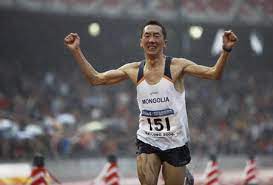
How Ser-Od Bat-Ochir got his groove back www.olympics.com/
After disappointing himself at Tokyo 2020 in 2021, the five-time Olympian from Mongolia has found his mojo again, eyeing a historic sixth marathon at Paris 2024.
Ser-Od Bat-Ochir has loved running as long as he can remember - especially the marathon.
He loves the challenge over the last 12 kilometres, the battle within against sheer mental and physical exhaustion.
So you know when someone with that kind of temperament says he can't go anymore, he really can't go.
And that is exactly how Bat-Ochir felt during the Tokyo 2020 marathon in Sapporo.
"I went to train in Chitose (near Sapporo) but I caught a bad cold there," the Mongolian told Olympics.com ahead of the 2022 World Athletics Championships, looking back on a race he failed to finish.
"I had a fever which sapped my strength. I could not run the race I was hoping for at the Tokyo Olympics.
"For around two months or so after the Olympics, it was very difficult for me. It had already been decided that I was going to quit my team after the Olympics so those two months were the toughest.
"It was mental, emotional. I was fine physically."
Ser-Od Bat-Ochir of Mongolia leaves as the last finisher with his team-mate Byambajav Tseveenravdan after the Men's Marathon at the World Athletics Championships Doha 2019 in Doha, Qatar.
Ser-Od Bat-Ochir of Mongolia leaves as the last finisher with his team-mate Byambajav Tseveenravdan after the Men's Marathon at the World Athletics Championships Doha 2019 in Doha, Qatar.
The five-time Olympian hit rock bottom in the months following a Games that should have been a career highlight, a Games held in his adopted home and training base of Japan.
Bat-Ochir thought about calling it quits, even thinking of taking up an ordinary everyday job.
And he actually might have, had it not been for the consoling words of his friends and his wife, Oyuntuya, who also has been coaching him since 2005.
Plus of course, Bat-Ochir's love for running.
"They told me, the Tokyo Olympics is in the past and that it was time to move on. They told me I should set a new goal for myself, the next Olympics and the world championships - and I began to feel that way.
"I thought a lot about what I wanted and I wanted to run the marathon. I love the marathon so I felt that is what I should do.
"Then I began training for my next race".
Paris via Oregon
The World Athletics Championships Oregon22 will be Bat-Ochir's 10th appearance in the marathon at the Track and Field championships which, according to World Athletics, is a runaway record.
With a time difference of 16 hours between his home and Oregon, he has prepared for the meet not in Japan but in Boulder, Colorado, where the cool climate is similar to Mongolia.
Bat-Ochir - whose personal best is 2 hours, 8 minutes and 50 seconds - believes his best race is still ahead of him.
Let us remember that he turns 41 in October. His goal for Oregon is to finish higher than 19th, which he recorded at the 2011 worlds in Daegu, South Korea.
Bat-Ochir believes a marathon runner's peak years are in between the ages of 37 and 45 as double Olympic champion Eliud Kipchoge has proved, when speed and stamina gels perfectly.
By his own account, he has run around 74 marathons (he says 'around 74' because he admits he's not 100 per cent sure) since taking up the 42km race in 2002.
If he makes it to Paris 2024 - and it would be foolish to think he can't - Bat-Ochir will become the first athlete in history to run six Olympic marathons.
He hopes to make that the final race of his career. And clearly, he has found his second wind.
"I want to run at the Paris Olympics," Bat-Ochir says. "I want to run my final marathon at the Paris Olympics and after that I want to go into coaching - but still train for myself, too."
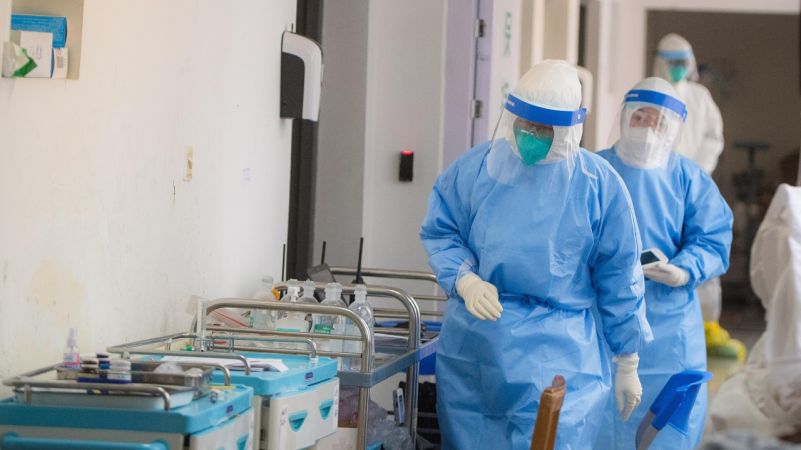
Mongolia reports 108 new coronavirus cases www.akipress.com
Mongolia reported 108 new coronavirus infections, the coronavirus statistics as of July 16 showed.
63 of them were revealed among persons who had contact with the infected in Ulaanbaatar, 45 other cases were detected in regions.
No new imported cases of COVID-19 were reported.
No new linked deaths were reported for a day, the death toll stands at 2,119 as of July 16.
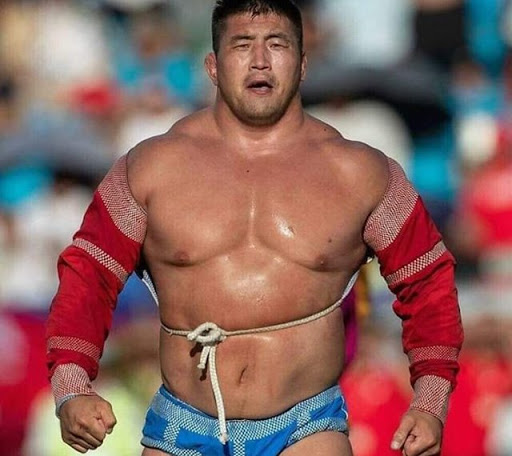
Mongolia’s Naadam Festival Found On Banknotes www.banknoteworld.com
The Naadam Festival, which is known as the “three games of men”, is an annual event celebrated in Mongolia from July 11 to July 13, commemorating the Mongolian People’s Revolution in 1921. The national festival exhibits marksmanship, horsemanship, and strength through the three games of archery, horseracing, and wrestling.
These ancient medieval sports have been popular in the military as a way to test the soldiers’ strength and train them for battles as well as their horses’ ability and alertness. Later, the three sporting competitions have been present in religious gatherings such as weddings. The festival was listed on the UNESCO’s Representative List of the Intangible Cultural Heritage of Humanity in 2010.
NAADAM ON MONGOLIAN BANKNOTES
Naadam Festival is the most anticipated and most watched festival of the Mongols. The three games of men are also on the 1993 issues of the mongo-denominated Mongolian banknotes. These notes are in a vertical orientation and do not have a security thread and watermark.
The obverse of the red 10-mongo paper bill displays two archers with bows and arrows. The same sport is also on the reverse of the note. The archery competition is played by teams of ten with each archer given four arrows and the team is given dozens of woven or wooden cylinder “surs” as targets.
Just like other most Mongolian banknotes, this 10-mongo note also features the national symbol of Mongolia, the Soyombo.
The tan-colored 20-mongo banknote, on the other hand, portrays two wrestlers on both the obverse and reverse sides. In Mongolian wrestling competitions, a wrestler loses to his opponent when any part of his body other than their feet or hands touched the ground.
Meanwhile, the horseracing sport is on the 50 mongo banknote. This banknote is predominantly blue and green and depicts two men riding on horses on both the front and back designs. The length of Mongolian horse racing events is usually 15-30 kilometers long, depending on the horse’s age class.
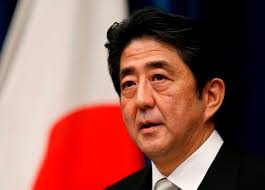
How Abe Shinzo Fortified Japan-Mongolia Relations www.thediplomat.com
This year marks the 50th anniversary of the establishment of Mongolia-Japan diplomatic relations. But in the middle of the landmark year, the political assassination of former Japanese Prime Minister Abe Shinzo was a significant shock to Mongolia, given the immense contribution of the Abe administration in bolstering Japan-Mongolia relations.
From its election win in late 2012 to Abe’s retirement in 2020, the Abe administration illustrated its commitment and continued efforts in bolstering Japan-Mongolia relations, which ultimately reached a peak in 2015 as the two countries became strategic partners.
From a Japanese foreign policy point of view, having Mongolia as a close partner helps Tokyo navigate regional issues such as dealing with North Korea. In addition, Mongolia’s democratic governance and society strengthened both government-to-government and people-to-people relations. During the Abe administration, the number of Mongolian students and workers in Japan increased immensely.
Moreover, Mongolia poses no direct threat to Japanese territorial integrity, making it somewhat of a rarity among Japan’s East Asian neighbors. Japan has ongoing territorial disputes with Russia (the Kuril Islands/Northern Territories), China (the Senkaku/Diaoyu Islands), and South Korea (the Dokdo/Takeshima Islands).
In Northeast Asia, the strong ties between Mongolia and Japan, both democratic nations, create a modus operandi for negotiations, dialogues, and conflict resolution. The Abe administration understood this strategic dynamic of Japan-Mongolia bilateral relations and enforced it in a mutually beneficial way.
Abe made his first state visit to Mongolia in 2013 on the occasion of the 40th anniversary of Japan-Mongolia diplomatic relations. Abe met with then-President Elbegdorj Tsakhia and Prime Minister Altankhuyag Norov. During an editorial written for Mongolian newspapers on the occasion of his visit, Abe stated that Japan-Mongolia relationship is supported by the “‘Three Spirits’ of freedom and democracy, peace, and mutual benefit.” On that basis, then-Foreign Minister Kishida Fumio – currently Japan’s prime minister – pledged in 2014 that “Mongolia and Japan will enhance mutual understanding and trust through multi-layered and strategic dialogue.”
Abe’s 2013 visit resulted in an economic agreement in which Japan supported Mongolia’s mining industry by establishing a credit line for purchasing mining machinery from Japanese companies such as Komatsu. In March 2013, Abe proposed the Erch Initiative to accelerate the Japan-Mongolia economic partnership. For Mongolia, Japan’s continued financial and technical support is fundamental in augmenting the country’s economic diversification.
During his second state visit to Ulaanbaatar in 2015, Abe emphasized his administration’s intention to make this visit a testament to the bond between the two countries and the development of their “strategic partnership.”
With visits in both 2013 and 2015, Abe became the first Japanese prime minister to visit Mongolia multiple times in a short period. Abe was also the first Japanese prime minister to meet three different presidents of Mongolia: Enkhbayar Nambar, Elbegdorj Tsakhia, and Battulga Khaltmaa. This showed both commitment and a genuine valuing of Japan-Mongolia diplomacy at the highest level of governments.
The Japan-Mongolia strategic partnership strengthened their economic relations and heightened security and military elements. The Abe administration, often criticized for encroaching on Japan’s postwar commitment to pacifism at home, viewed partnership with a non-threatening country like Mongolia as an advantage to Japan’s strategic behavior.
After Abe’s second state visit to Mongolia, the Japan Self-Defense Forces began participating in Mongolia’s Khaan Quest multilateral military training for the United Nations peacekeeping operations. Since 2012, the Japanese Ground Self-Defense Forces have been training the Mongolian Armed Forces in military medicine, particularly in mass-casualty response exercises.
In the eight years that Abe was in office, Japan aimed to accelerate its international presence and influence. The Abe administration accelerated Japan’s status on the international stage by pursuing membership in the United Nations Security Council. Mongolia has been supportive of Abe’s approach. The former prime minister of Mongolia, Saikhanbileg Chimed, expressed the Mongolian government’s support for Japan’s international presence.
The Abe administration understood both the historical relevance and the contemporary necessity to move the Japan-Mongolia relationship forward as two democratic nations in an ever-changing region. The Abe administration’s legacy in Japan-Mongolia relations will be that he made the strategic partnership a reality, strengthening both government-to-government and people-to-people relations.
Mongolian Prime Minister Oyun-Erdene Luvsannamsra and Foreign Minister Battsetseg Batmunkh visited the Japanese embassy in Ulaanbaatar to pay their respects to Abe and sign a book of condolences. “While emphasizing that the ‘Proactive Contribution to Peace’ foreign policy implemented by the late Prime Minister has made a valuable contribution to regional cooperation and prosperity, Prime Minister L.Oyun-Erdene underscored that his efforts to further strengthen Mongolia-Japan relations will always be remembered,” Mongolia’s Montsame news agency reported.
Former President Enkhbayar Nambar and former foreign minister of Mongolia Tsogtbaatar Damdin also paid visits to the embassy to sign the condolence book for Abe.
GUEST AUTHOR
Bolor Lkhaajav
Bolor Lkhaajav is a researcher specializing in Mongolia, China, Russia, Japan, East Asia, and the Americas. She holds an M.A. in Asia-Pacific Studies from the University of San Francisco.
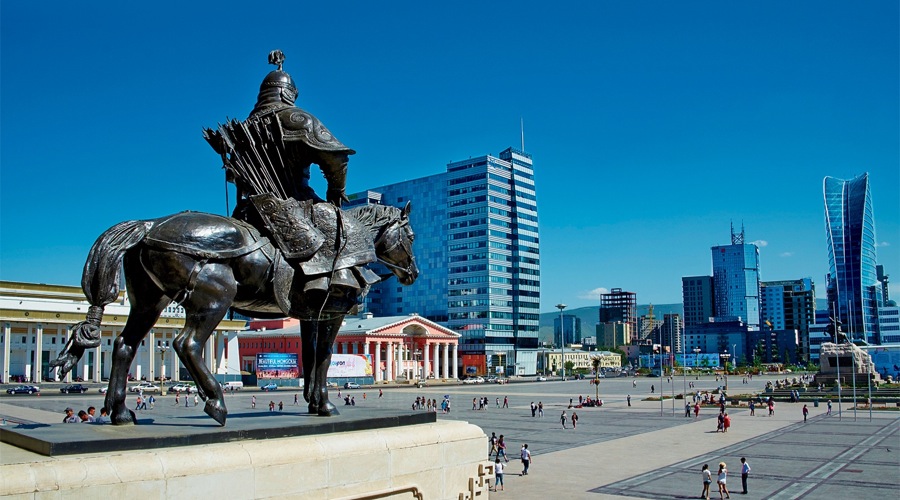
Mongolia – Celebrating 30 years of Church's presence in the Country www.infoans.org
In a mission country like Mongolia - where there are about 1,300 Catholics, out of a population of more than 3 million people - remembering one's roots and joining forces with all those involved in evangelization are two fundamental attitudes to be able to continue sowing the Gospel message. That is why the Salesians present in Mongolia were pleased to celebrate the 30th anniversary of the Catholic Church’s presence in Mongolia with the rest of the country's small ecclesial reality.
It was in July 1992, after the fall of the communist regime, that the Church was able to return to the country: the first missionaries sent belonged to the Congregation of the Immaculate Heart of Mary and were Fathers Wenceslao Padilla, Gilbert Sales, and Robert Goessens.
That is why, on July 9, Archbishop Alfred Xuereb, Apostolic Nuncio to both South Korea and Mongolia, with his secretary and with the Apostolic Prefect of Ulan Bator and Cardinal-elect Giorgio Marengo, and together with all the missionaries of Mongolia - including the Salesians - and Fr. Gilbert Sales, who came especially from the Philippines, and some Mongolian friends, gathered at the tomb of Msgr. Wenceslao Padilla, who had been the head of the Mission "Sui Iuris," since 1992, and then the first Apostolic Prefect of Ulan Bator, until his death in 2018.
For the occasion, the Apostolic Nuncio blessed the new altar next to Msgr. Padilla's tomb and celebrated Mass. Then Msgr. Marengo shared some information about the Church's mission in the country and what is being accomplished and said that all together they were building the dream of the late Msgr. Padilla, "who today will be happy to see us from Heaven gathered around him, humbly loving and serving our beloved Mongolia."
The main celebration took place the following day, Sunday, July 10: early in the morning many parishioners arrived at the cathedral from many places, the most distant from more than 400 km away, some bringing food and drinks for the feast day, while others started cooking in the area. By 10:00 a.m., many priests were invited to hear confessions for the many attendees as the cathedral filled with people: guests, visitors, many leaders of different religions.
During the solemn Eucharist, the Nuncio expressed a message of gratitude: to God, the pioneers, and missionaries who still live and work for the mission of the Mongolian Church! But his words of gratitude were also extended to the local government, the people, the faithful, and all the friends inside and outside the country who accompany in various ways, factually or with prayers, this mission.
"The mission started 30 years ago: it seems a long time, but for God, it will seem to be yesterday... and the mission still goes on with many challenges and changes, but all in hope, faith, with sacrifice and witness!" commented Fr. Andrew Tin Nguyen, a Salesian of Don Bosco originally from Vietnam and active in Darkhan.
The Salesian presence in Mongolia is under the care of the "St. John Bosco" Province of Vietnam (VIE) and was started in 2001, with a technical school and oratory opened in the capital, Ulan Bator. In 2004, a parish with oratory was started in Darkhan, in the north-central region of the country; finally, since 2016, they have also taken over the pastoral care of the mission in Shuwuu, not far from the capital.
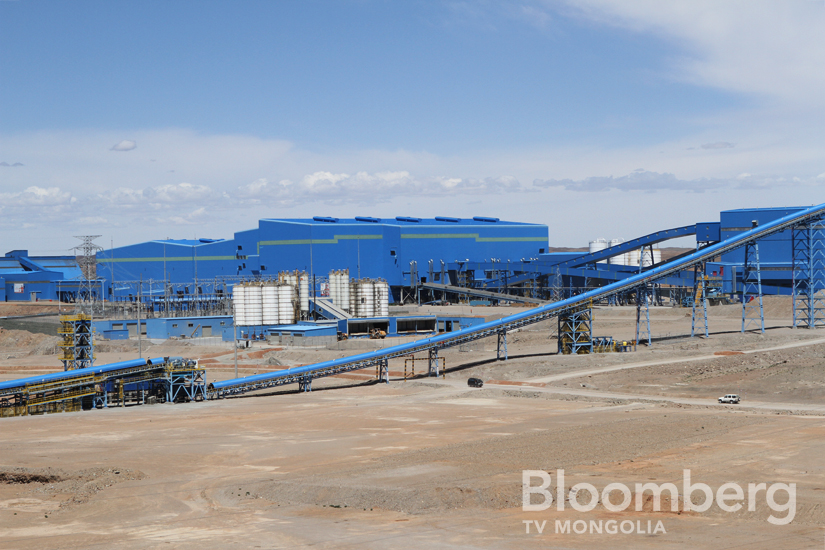
Cost of expansion at Rio Tinto’s Oyu Tolgoi rises again www.mining.com
Rio Tinto (ASX, LON, NYSE: RIO) flagged on Friday a cost increase of $300 million for the ongoing expansion of its massive Oyu Tolgoi copper-gold mine in Mongolia.
The world’s second largest miner said the cost and schedule reforecast, completed in June, now pegs the total project cost estimate at $7.06 billion, almost $1.8 billion higher than its original estimate in 2015.
The company blamed the rise on skilled labour supply constraints caused by covid-19 and noted the new estimate, under review by Oyu Tolgoi’s board, assumes there are no further disruptions.
Rio Tinto currently controls and operates the mine, located 550 km (342 miles) south of Mongolia’s capital Ulaanbaatar, through its 66% stake in Canada’s Turquoise Hill Resources (TSX, NYSE: TRQ). The government of Mongolia owns 34%.
The mining giant is currently trying to buy all the shares it doesn’t already own in Turquoise Hill.
Rio’s chief executive Jakob Stausholm has said he believes the acquisition would simplify the ownership structure, and further strengthen the company’s copper portfolio.
The offer followed an agreement between the miner and the government of Mongolia to complete the long-delayed underground expansion.
That deal saw Rio agree to write off $2.4 billion in loans and interest used by Ulan Bator to fund its share of the development costs.
There was no update on the proposed C$34.00 per share buyout.
Turquoise Hill said in a separate statement it expected its portion of total operating cash costs at Oyu Tolgoi to increase by $50 million for this year. It means they are now expected to be in the range of between $850 million and $925 million, higher than previous guidance of $800 million to $875 million.
This was due to higher royalties and price inflation for key raw materials, especially fuel and the lower deferred stripping, the firm said.
Three-year delay and counting
The ongoing expansion of Oyu Tolgoi has been plagued by delays and costs overruns, which have triggered the Mongolian government’s ire to the point of threatening to revoke the 2009 investment agreement, which underpins the mine development.
First production, initially expected in late 2020, was rescheduled for October 2022 and later to the first half of 2023.
Rio Tinto said on Friday that technical progress has been hindered, with shafts 3 and 4 now expected to be commissioned in the first half of 2024, 15 months later than what the company estimated in 2020.
Oyu Tolgoi is Rio’s main copper growth project. Once completed, the underground section will lift production from 125,000–150,000 tonnes in 2019 to 560,000 tonnes at peak output, which is now expected by 2025 at the earliest.
According to the miner, this would make it the biggest new copper mine to come on stream in several years and, by 2030, the operation would be the world’s fourth largest copper mine.
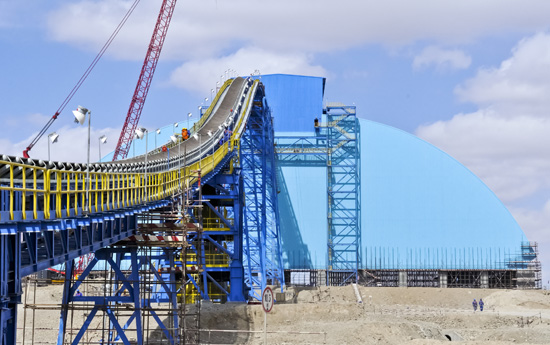
Prime Minister receives CEO of Rio Tinto Group www.montsame.mn
Prime Minister of Mongolia L.Oyun-Erdene received Chief Executive Officer of Rio Tinto Group Jakob Stausholm.
During the meeting, the sides exchanged views on the implementation of the parliamentary resolution on measures to be taken to ensure the benefits to Mongolia from Oyu Tolgoi deposits, and the progress of the Government’s negotiations with the Rio Tinto Group.
The sides mutually agreed to put the construction of the underground mine into full operation by the first quarter of 2023. Thus, in January 2022, the Prime Minister of Mongolia L.Oyun-Erdene and CEO of Rio Tinto Jakob Stausholm together pressed a button to commence the first blast to start the initial stage of Oyu Tolgoi's underground mine development.
In this context, Rio Tinto CEO Jakob Stausholm emphasized that the works are underway to intensify the construction of the underground mine and put it into operation ahead of schedule and the talks are continuing successfully.
The meeting also touched on the development projects that are being implemented by Rio Tinto Group in Khanbogd and Tsogttsetsii soums of Umnugobi aimag.
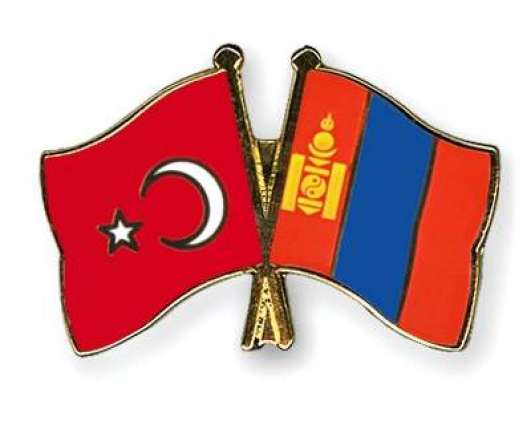
Mongolia-Turkey joint research team finds ruins of summer palace of Hulagu Khan www.montsame.mn
Chairman of the State Great Khural G.Zandanshatar received a team of researchers led by Dr. D.Ankhbayar on July 5.
On June 12-18 this year, the joint research team of the Turcology Research Institute within the National University of Mongolia and Izmir Katip Çelebi University Turkic Studies Application and Research Center found the ruins of a summer palace and settlement that were built in the 1260s by a ruler of the Mongol Ilkhanate State Hulagu Khan in Van province of the Republic of Turkey.
It was the first research that was conducted abroad by Mongolian researchers with official permission. During the meeting, the team emphasized that the research was successfully carried out thanks to the support provided by the Chairman of the State Great Khural.
Historical sources in ancient Persian and Armenian state that Hulagu Khan had his summer palace built between 1261 and 1265 in the fertile region in present-day Van province of Turkey. As a result of many years of research, the ruins of this summer palace were discovered and rare valuable artifacts were unearthed to confirm historical facts and information. In the first days of the research, the scientists found the remains of ceramics that trace back to the period of Hulagu Khan.
Director of Turcology Research Institute Dr. D.Ankhbayar said, “To date, the ruins of palaces of three Mongol Khans, including the palace of Kublai Khan in Inner Mongolian Autonomous Region, the summer palace of Ambaghai Khan in Iran and Sarai city of the Golden Horde, were found. This time, we discovered the fourth palace. It is believed that it was a palace-city with an area of at least 1200x1200 meters. Archeological research excavations are planned to be carried out in cooperation with Turkish scientists," adding that it is necessary to prepare for the excavations within the legal framework, and he asked the Chairman to support this at the decision-making level.
Speaker G.Zandanshatar said, "As a result of many years of research by our distinguished archaeologists and scientists, the discovery of the previously unexplored summer palace of Khulegu Khan, the founder of the Ilkhanate, has become an important discovery in the history and archeology of Mongolia as well as the world. I am confident that the research will be intensified and many historical artifacts will be found in the future”.
The researchers said that the model of the city of Kharkhorum was probably used in terms of building design and architectural arrangement. The construction of a Buddhist temple and the involvement of Buddhist sculptors and artisans in the decoration of the palace increase the possibility that the palace is Mongolian in nature. The preliminary observation of the research team revealed the remains of blue and green pottery of the Ilkhanate period, as well as the remains of wall-patterned pottery.
The meeting was attended by Director of Turcology Research Institute Dr. D.Ankhbayar, Director of the Institute of Archaeology of the Mongolian Academy of Sciences Dr. A.Enkhtur, Professor of the Mongolian University of Science and Technology Dr. Yu.Boldbaatar, and Historian Dr. B.Enkhchimeg.
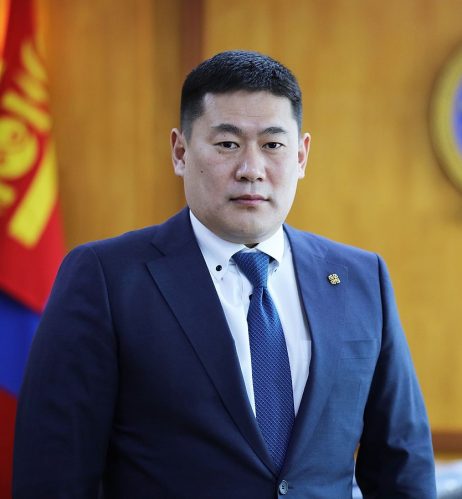
Mongolia and Singapore to cooperate in digital development www.montsame.mn
Prime Minister L.Oyun-Erdene met with Minister of Communications and Information and Minister-in-charge of the Cyber Security Agency and Smart Nation Initiative of the Republic of Singapore Josephine Teo today.
While emphasizing the crucial role of the internet and information technology in the development of the rapidly evolving world, the Prime Minister introduced the Government of Mongolia’s goal of becoming a digital nation, as well as the works that are underway to achieve this goal.
“The Government of Mongolia made changes to its structure, establishing the Ministry of Communications and Digital Development. Information technology is one of the six priority sectors reflected in Mongolia’s long-term development policy, ‘Vision-2050’. By introducing good practices of the leading countries in the industry, the Government is aiming to implement the ‘Digital City’ project”, said the Prime Minister.
Ideas were exchanged on cooperation with Singapore in the directions such as introducing Singapore's good practices in Mongolia, making reforms to civil service based on the digital transition, improving digital governance, strengthening the communications sector, and ensuring cyber security.
The sides agreed to intensify the cooperation between the Ministry of Communications and Digital Development of Mongolia and the Ministry of Communications and Information of Singapore and to cooperate in future joint projects and programs, and in the fields of innovation, digital development, and information technology.
“Over the years, the experiences of many countries have been studied in increasing the productivity of the public sector, urban planning and solving traffic congestion”, said the Minister, while expressing readiness to share its good practices in this regard.
- «
- 1
- 2
- 3
- 4
- 5
- 6
- 7
- 8
- 9
- 10
- 11
- 12
- 13
- 14
- 15
- 16
- 17
- 18
- 19
- 20
- 21
- 22
- 23
- 24
- 25
- 26
- 27
- 28
- 29
- 30
- 31
- 32
- 33
- 34
- 35
- 36
- 37
- 38
- 39
- 40
- 41
- 42
- 43
- 44
- 45
- 46
- 47
- 48
- 49
- 50
- 51
- 52
- 53
- 54
- 55
- 56
- 57
- 58
- 59
- 60
- 61
- 62
- 63
- 64
- 65
- 66
- 67
- 68
- 69
- 70
- 71
- 72
- 73
- 74
- 75
- 76
- 77
- 78
- 79
- 80
- 81
- 82
- 83
- 84
- 85
- 86
- 87
- 88
- 89
- 90
- 91
- 92
- 93
- 94
- 95
- 96
- 97
- 98
- 99
- 100
- 101
- 102
- 103
- 104
- 105
- 106
- 107
- 108
- 109
- 110
- 111
- 112
- 113
- 114
- 115
- 116
- 117
- 118
- 119
- 120
- 121
- 122
- 123
- 124
- 125
- 126
- 127
- 128
- 129
- 130
- 131
- 132
- 133
- 134
- 135
- 136
- 137
- 138
- 139
- 140
- 141
- 142
- 143
- 144
- 145
- 146
- 147
- 148
- 149
- 150
- 151
- 152
- 153
- 154
- 155
- 156
- 157
- 158
- 159
- 160
- 161
- 162
- 163
- 164
- 165
- 166
- 167
- 168
- 169
- 170
- 171
- 172
- 173
- 174
- 175
- 176
- 177
- 178
- 179
- 180
- 181
- 182
- 183
- 184
- 185
- 186
- 187
- 188
- 189
- 190
- 191
- 192
- 193
- 194
- 195
- 196
- 197
- 198
- 199
- 200
- 201
- 202
- 203
- 204
- 205
- 206
- 207
- 208
- 209
- 210
- 211
- 212
- 213
- 214
- 215
- 216
- 217
- 218
- 219
- 220
- 221
- 222
- 223
- 224
- 225
- 226
- 227
- 228
- 229
- 230
- 231
- 232
- 233
- 234
- 235
- 236
- 237
- 238
- 239
- 240
- 241
- 242
- 243
- 244
- 245
- 246
- 247
- 248
- 249
- 250
- 251
- 252
- 253
- 254
- 255
- 256
- 257
- 258
- 259
- 260
- 261
- 262
- 263
- 264
- 265
- 266
- 267
- 268
- 269
- 270
- 271
- 272
- 273
- 274
- 275
- 276
- 277
- 278
- 279
- 280
- 281
- 282
- 283
- 284
- 285
- 286
- 287
- 288
- 289
- 290
- 291
- 292
- 293
- 294
- 295
- 296
- 297
- 298
- 299
- 300
- 301
- 302
- 303
- 304
- 305
- 306
- 307
- 308
- 309
- 310
- 311
- 312
- 313
- 314
- 315
- 316
- 317
- 318
- 319
- 320
- 321
- 322
- 323
- 324
- 325
- 326
- 327
- 328
- 329
- 330
- 331
- 332
- 333
- 334
- 335
- 336
- 337
- 338
- 339
- 340
- 341
- 342
- 343
- 344
- 345
- 346
- 347
- 348
- 349
- 350
- 351
- 352
- 353
- 354
- 355
- 356
- 357
- 358
- 359
- 360
- 361
- 362
- 363
- 364
- 365
- 366
- 367
- 368
- 369
- 370
- 371
- 372
- 373
- 374
- 375
- 376
- 377
- 378
- 379
- 380
- 381
- 382
- 383
- 384
- 385
- 386
- 387
- 388
- 389
- 390
- 391
- 392
- 393
- 394
- 395
- 396
- 397
- 398
- 399
- 400
- 401
- 402
- 403
- 404
- 405
- 406
- 407
- 408
- 409
- 410
- 411
- 412
- 413
- 414
- 415
- 416
- 417
- 418
- 419
- 420
- 421
- 422
- 423
- 424
- 425
- 426
- 427
- 428
- 429
- 430
- 431
- 432
- 433
- 434
- 435
- 436
- 437
- 438
- 439
- 440
- 441
- 442
- 443
- 444
- 445
- 446
- 447
- 448
- 449
- 450
- 451
- 452
- 453
- 454
- 455
- 456
- 457
- 458
- 459
- 460
- 461
- 462
- 463
- 464
- 465
- 466
- 467
- 468
- 469
- 470
- 471
- 472
- 473
- 474
- 475
- 476
- 477
- 478
- 479
- 480
- 481
- 482
- 483
- 484
- 485
- 486
- 487
- 488
- 489
- 490
- 491
- 492
- 493
- 494
- 495
- 496
- 497
- 498
- 499
- 500
- 501
- 502
- 503
- 504
- 505
- 506
- 507
- 508
- 509
- 510
- 511
- 512
- 513
- 514
- 515
- 516
- 517
- 518
- 519
- 520
- 521
- 522
- 523
- 524
- 525
- 526
- 527
- 528
- 529
- 530
- 531
- 532
- 533
- 534
- 535
- 536
- 537
- 538
- 539
- 540
- 541
- 542
- 543
- 544
- 545
- 546
- 547
- 548
- 549
- 550
- 551
- 552
- 553
- 554
- 555
- 556
- 557
- 558
- 559
- 560
- 561
- 562
- 563
- 564
- 565
- 566
- 567
- 568
- 569
- 570
- 571
- 572
- 573
- 574
- 575
- 576
- 577
- 578
- 579
- 580
- 581
- 582
- 583
- 584
- 585
- 586
- 587
- 588
- 589
- 590
- 591
- 592
- 593
- 594
- 595
- 596
- 597
- 598
- 599
- 600
- 601
- 602
- 603
- 604
- 605
- 606
- 607
- 608
- 609
- 610
- 611
- 612
- 613
- 614
- 615
- 616
- 617
- 618
- 619
- 620
- 621
- 622
- 623
- 624
- 625
- 626
- 627
- 628
- 629
- 630
- 631
- 632
- 633
- 634
- 635
- 636
- 637
- 638
- 639
- 640
- 641
- 642
- 643
- 644
- 645
- 646
- 647
- 648
- 649
- 650
- 651
- 652
- 653
- 654
- 655
- 656
- 657
- 658
- 659
- 660
- 661
- 662
- 663
- 664
- 665
- 666
- 667
- 668
- 669
- 670
- 671
- 672
- 673
- 674
- 675
- 676
- 677
- 678
- 679
- 680
- 681
- 682
- 683
- 684
- 685
- 686
- 687
- 688
- 689
- 690
- 691
- 692
- 693
- 694
- 695
- 696
- 697
- 698
- 699
- 700
- 701
- 702
- 703
- 704
- 705
- 706
- 707
- 708
- 709
- 710
- 711
- 712
- 713
- 714
- 715
- 716
- 717
- 718
- 719
- 720
- 721
- 722
- 723
- 724
- 725
- 726
- 727
- 728
- 729
- 730
- 731
- 732
- 733
- 734
- 735
- 736
- 737
- 738
- 739
- 740
- 741
- 742
- 743
- 744
- 745
- 746
- 747
- 748
- 749
- 750
- 751
- 752
- 753
- 754
- 755
- 756
- 757
- 758
- 759
- 760
- 761
- 762
- 763
- 764
- 765
- 766
- 767
- 768
- 769
- 770
- 771
- 772
- 773
- 774
- 775
- 776
- 777
- 778
- 779
- 780
- 781
- 782
- 783
- 784
- 785
- 786
- 787
- 788
- 789
- 790
- 791
- 792
- 793
- 794
- 795
- 796
- 797
- 798
- 799
- 800
- 801
- 802
- 803
- 804
- 805
- 806
- 807
- 808
- 809
- 810
- 811
- 812
- 813
- 814
- 815
- 816
- 817
- 818
- 819
- 820
- 821
- 822
- 823
- 824
- 825
- 826
- 827
- 828
- 829
- 830
- 831
- 832
- 833
- 834
- 835
- 836
- 837
- 838
- 839
- 840
- 841
- 842
- 843
- 844
- 845
- 846
- 847
- 848
- 849
- 850
- 851
- 852
- 853
- 854
- 855
- 856
- 857
- 858
- 859
- 860
- 861
- 862
- 863
- 864
- 865
- 866
- 867
- 868
- 869
- 870
- 871
- 872
- 873
- 874
- 875
- 876
- 877
- 878
- 879
- 880
- 881
- 882
- 883
- 884
- 885
- 886
- 887
- 888
- 889
- 890
- 891
- 892
- 893
- 894
- 895
- 896
- 897
- 898
- 899
- 900
- 901
- 902
- 903
- 904
- 905
- 906
- 907
- 908
- 909
- 910
- 911
- 912
- 913
- 914
- 915
- 916
- 917
- 918
- 919
- 920
- 921
- 922
- 923
- 924
- 925
- 926
- 927
- 928
- 929
- 930
- 931
- 932
- 933
- 934
- 935
- 936
- 937
- 938
- 939
- 940
- 941
- 942
- 943
- 944
- 945
- 946
- 947
- 948
- 949
- 950
- 951
- 952
- 953
- 954
- 955
- 956
- 957
- 958
- 959
- 960
- 961
- 962
- 963
- 964
- 965
- 966
- 967
- 968
- 969
- 970
- 971
- 972
- 973
- 974
- 975
- 976
- 977
- 978
- 979
- 980
- 981
- 982
- 983
- 984
- 985
- 986
- 987
- 988
- 989
- 990
- 991
- 992
- 993
- 994
- 995
- 996
- 997
- 998
- 999
- 1000
- 1001
- 1002
- 1003
- 1004
- 1005
- 1006
- 1007
- 1008
- 1009
- 1010
- 1011
- 1012
- 1013
- 1014
- 1015
- 1016
- 1017
- 1018
- 1019
- 1020
- 1021
- 1022
- 1023
- 1024
- 1025
- 1026
- 1027
- 1028
- 1029
- 1030
- 1031
- 1032
- 1033
- 1034
- 1035
- 1036
- 1037
- 1038
- 1039
- 1040
- 1041
- 1042
- 1043
- 1044
- 1045
- 1046
- 1047
- 1048
- 1049
- 1050
- 1051
- 1052
- 1053
- 1054
- 1055
- 1056
- 1057
- 1058
- 1059
- 1060
- 1061
- 1062
- 1063
- 1064
- 1065
- 1066
- 1067
- 1068
- 1069
- 1070
- 1071
- 1072
- 1073
- 1074
- 1075
- 1076
- 1077
- 1078
- 1079
- 1080
- 1081
- 1082
- 1083
- 1084
- 1085
- 1086
- 1087
- 1088
- 1089
- 1090
- 1091
- 1092
- 1093
- 1094
- 1095
- 1096
- 1097
- 1098
- 1099
- 1100
- 1101
- 1102
- 1103
- 1104
- 1105
- 1106
- 1107
- 1108
- 1109
- 1110
- 1111
- 1112
- 1113
- 1114
- 1115
- 1116
- 1117
- 1118
- 1119
- 1120
- 1121
- 1122
- 1123
- 1124
- 1125
- 1126
- 1127
- 1128
- 1129
- 1130
- 1131
- 1132
- 1133
- 1134
- 1135
- 1136
- 1137
- 1138
- 1139
- 1140
- 1141
- 1142
- 1143
- 1144
- 1145
- 1146
- 1147
- 1148
- 1149
- 1150
- 1151
- 1152
- 1153
- 1154
- 1155
- 1156
- 1157
- 1158
- 1159
- 1160
- 1161
- 1162
- 1163
- 1164
- 1165
- 1166
- 1167
- 1168
- 1169
- 1170
- 1171
- 1172
- 1173
- 1174
- 1175
- 1176
- 1177
- 1178
- 1179
- 1180
- 1181
- 1182
- 1183
- 1184
- 1185
- 1186
- 1187
- 1188
- 1189
- 1190
- 1191
- 1192
- 1193
- 1194
- 1195
- 1196
- 1197
- 1198
- 1199
- 1200
- 1201
- 1202
- 1203
- 1204
- 1205
- 1206
- 1207
- 1208
- 1209
- 1210
- 1211
- 1212
- 1213
- 1214
- 1215
- 1216
- 1217
- 1218
- 1219
- 1220
- 1221
- 1222
- 1223
- 1224
- 1225
- 1226
- 1227
- 1228
- 1229
- 1230
- 1231
- 1232
- 1233
- 1234
- 1235
- 1236
- 1237
- 1238
- 1239
- 1240
- 1241
- 1242
- 1243
- 1244
- 1245
- 1246
- 1247
- 1248
- 1249
- 1250
- 1251
- 1252
- 1253
- 1254
- 1255
- 1256
- 1257
- 1258
- 1259
- 1260
- 1261
- 1262
- 1263
- 1264
- 1265
- 1266
- 1267
- 1268
- 1269
- 1270
- 1271
- 1272
- 1273
- 1274
- 1275
- 1276
- 1277
- 1278
- 1279
- 1280
- 1281
- 1282
- 1283
- 1284
- 1285
- 1286
- 1287
- 1288
- 1289
- 1290
- 1291
- 1292
- 1293
- 1294
- 1295
- 1296
- 1297
- 1298
- 1299
- 1300
- 1301
- 1302
- 1303
- 1304
- 1305
- 1306
- 1307
- 1308
- 1309
- 1310
- 1311
- 1312
- 1313
- 1314
- 1315
- 1316
- 1317
- 1318
- 1319
- 1320
- 1321
- 1322
- 1323
- 1324
- 1325
- 1326
- 1327
- 1328
- 1329
- 1330
- 1331
- 1332
- 1333
- 1334
- 1335
- 1336
- 1337
- 1338
- 1339
- 1340
- 1341
- 1342
- 1343
- 1344
- 1345
- 1346
- 1347
- 1348
- 1349
- 1350
- 1351
- 1352
- 1353
- 1354
- 1355
- 1356
- 1357
- 1358
- 1359
- 1360
- 1361
- 1362
- 1363
- 1364
- 1365
- 1366
- 1367
- 1368
- 1369
- 1370
- 1371
- 1372
- 1373
- 1374
- 1375
- 1376
- 1377
- 1378
- 1379
- 1380
- 1381
- 1382
- 1383
- 1384
- 1385
- 1386
- 1387
- 1388
- 1389
- 1390
- 1391
- 1392
- 1393
- 1394
- 1395
- 1396
- 1397
- 1398
- 1399
- 1400
- 1401
- 1402
- 1403
- 1404
- 1405
- 1406
- 1407
- 1408
- 1409
- 1410
- 1411
- 1412
- 1413
- 1414
- 1415
- 1416
- 1417
- 1418
- 1419
- 1420
- 1421
- 1422
- 1423
- 1424
- 1425
- 1426
- 1427
- 1428
- 1429
- 1430
- 1431
- 1432
- 1433
- 1434
- 1435
- 1436
- 1437
- 1438
- 1439
- 1440
- 1441
- 1442
- 1443
- 1444
- 1445
- 1446
- 1447
- 1448
- 1449
- 1450
- 1451
- 1452
- 1453
- 1454
- 1455
- 1456
- 1457
- 1458
- 1459
- 1460
- 1461
- 1462
- 1463
- 1464
- 1465
- 1466
- 1467
- 1468
- 1469
- 1470
- 1471
- 1472
- 1473
- 1474
- 1475
- 1476
- 1477
- 1478
- 1479
- 1480
- 1481
- 1482
- 1483
- 1484
- 1485
- 1486
- 1487
- 1488
- 1489
- 1490
- 1491
- 1492
- 1493
- 1494
- 1495
- 1496
- 1497
- 1498
- 1499
- 1500
- 1501
- 1502
- 1503
- 1504
- 1505
- 1506
- 1507
- 1508
- 1509
- 1510
- 1511
- 1512
- 1513
- 1514
- 1515
- 1516
- 1517
- 1518
- 1519
- 1520
- 1521
- 1522
- 1523
- 1524
- 1525
- 1526
- 1527
- 1528
- 1529
- 1530
- 1531
- 1532
- 1533
- 1534
- 1535
- 1536
- 1537
- 1538
- 1539
- 1540
- 1541
- 1542
- 1543
- 1544
- 1545
- 1546
- 1547
- 1548
- 1549
- 1550
- 1551
- 1552
- 1553
- 1554
- 1555
- 1556
- 1557
- 1558
- 1559
- 1560
- 1561
- 1562
- 1563
- 1564
- 1565
- 1566
- 1567
- 1568
- 1569
- 1570
- 1571
- 1572
- 1573
- 1574
- 1575
- 1576
- 1577
- 1578
- 1579
- 1580
- 1581
- 1582
- 1583
- 1584
- 1585
- 1586
- 1587
- 1588
- 1589
- 1590
- 1591
- 1592
- 1593
- 1594
- 1595
- 1596
- 1597
- 1598
- 1599
- 1600
- 1601
- 1602
- 1603
- 1604
- 1605
- 1606
- 1607
- 1608
- 1609
- 1610
- 1611
- 1612
- 1613
- 1614
- 1615
- 1616
- 1617
- 1618
- 1619
- 1620
- 1621
- 1622
- 1623
- 1624
- 1625
- 1626
- 1627
- 1628
- 1629
- 1630
- 1631
- 1632
- 1633
- 1634
- 1635
- 1636
- 1637
- 1638
- 1639
- 1640
- 1641
- 1642
- 1643
- 1644
- 1645
- 1646
- 1647
- 1648
- 1649
- 1650
- 1651
- 1652
- 1653
- 1654
- 1655
- 1656
- 1657
- 1658
- 1659
- 1660
- 1661
- 1662
- 1663
- 1664
- 1665
- 1666
- 1667
- 1668
- 1669
- 1670
- 1671
- 1672
- 1673
- 1674
- 1675
- 1676
- 1677
- 1678
- 1679
- 1680
- 1681
- 1682
- 1683
- 1684
- 1685
- 1686
- 1687
- 1688
- 1689
- 1690
- 1691
- 1692
- 1693
- 1694
- 1695
- 1696
- 1697
- 1698
- 1699
- 1700
- 1701
- 1702
- 1703
- 1704
- 1705
- 1706
- 1707
- 1708
- 1709
- 1710
- 1711
- 1712
- 1713
- 1714
- »






